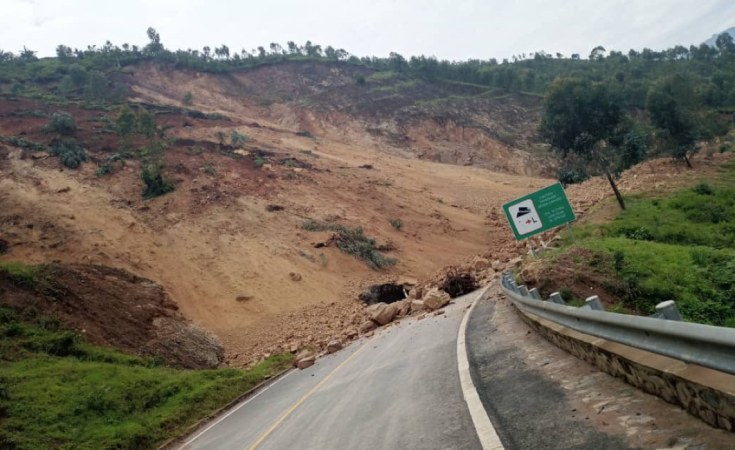The Rwanda Water Resources Board (RWB) says it is monitoring several areas in various districts that have recently encountered unfamiliar landslides, amid concerns of potential recurrence.
The heightened surveillance follows three significant landslides that occurred in Kamonyi, Karongi, and Rusizi Districts in February and early this month.
ALSO READ: Govt to identify 'disaster hotspots' ahead of three-month heavy rains
One such landslide struck Kamonyi District on February 21 in Nyarubaka Sector, Kigusa Cell, Rugarama Village, even though there was no rainfall at the time.
Locals reported heavy rainfall on February 14, preceding the incident.
The landslide originated near a domestic water collection tap within an existing runoff water channel, designed to collect groundwater without a pump.
ALSO READ: Landslides: Karongi-Nyamasheke road cleared
Following the landslide, water persisted in flowing from upstream towards the former collection point, creating a stream that will eventually merge with the Gahama stream downhill.
Explaining the phenomenon, the water resources board said, "This landslide occurred due to high water saturation in the ground, a result of the force exerted by water between the rock and the ground."
Bernard Segatagara Musana, a soil scientist and Head of the Knowledge and Forecasting Hub Department at RWB, highlighted the landslide's aftermath, indicating the creation of a pit spanning approximately 0.6 hectares, with soil debris covering an area of about 2.5 hectares.
ALSO READ: Districts with households in high-risk zones to be resettled identified
He emphasized ongoing instability along the pit's edges, necessitating continuous monitoring to facilitate timely intervention if required.
While no direct casualties or structural damage were reported, Musana revealed that three families, totaling six individuals, have been evacuated, with seven more families slated for evacuation due to the impact on 2.6 hectares of crops, while three additional hectares remain at risk.
In separate incidents, landslides occurred in January and March on Bikombe hill in Nyakerenzo sector of Rusizi District, obstructing the Rusizi River, which flows between Rwanda and the Democratic Republic of Congo.
ALSO READ: Four school children from same family perished in Rubavu landslides
Over 50 families suffered crop losses as a result.
Musana explained that the collapsed scree and soil formed a barrier akin to a dam, causing water to spill over and breach the blockade, although a significant amount of soil debris remains.
Efforts are underway, involving collaboration between Rusizi District and transboundary cooperation projects, to remove the accumulated debris and prevent further complications during peak flow events.
Meanwhile, in Karongi District, authorities have initiated the relocation of 48 households, comprising 200 individuals, from Rugeyo hill in Rubengera sector following a landslide, which occurred without precipitation.
Pascasie Umuhoza, Vice Mayor in charge of social affairs in Karongi District, noted that an additional 12 households on the hill urgently require evacuation, pending further assessment of the landslide's causes.
In February, the Ministry in charge of Emergency Management (MINEMA) announced the identification of 'disaster hotspots' susceptible to floods and landslides across the country, with plans for preemptive relocation of families from high-risk zones ahead of the heavy rains expected from March to May.
Fourteen districts, including Rubavu, Karongi, Rutsiro, Ngororero, Nyabihu, Burera, Rusizi, Rulindo, Gicumbi, Gakenke, Nyamasheke, Nyamagabe, Musanze, and Muhanga, have been identified for urgent intervention.


